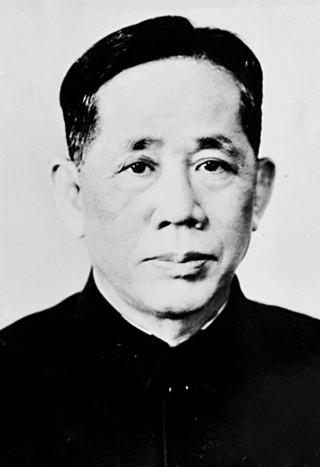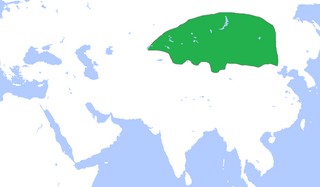Duan language may refer to:
- Duan language (Austroasiatic), a language of Laos and Vietnam
- Duan language (Para-Mongolic), an extinct language of China
Duan language may refer to:

Lê Duẩn was a Vietnamese communist politician. He rose in the party hierarchy in the late 1950s and became General Secretary of the Central Committee of the Communist Party of Vietnam (VCP) at the 3rd National Congress in 1960. He continued Hồ Chí Minh's policy of ruling through collective leadership. From the mid-1960s until his own death in 1986, he was the top decision-maker in Vietnam.

The Sui people, also spelled as Shui people, are an ethnic group living mostly in Guizhou Province, China. They are counted as one of the 56 ethnic groups officially recognized by the People's Republic of China.
The Duan was a pre-state tribe of Xianbei ethnicity during the era of Sixteen Kingdoms in China.
Jiang / Chiang can be a Mandarin transliteration of one of several Chinese surnames:

The Dali Kingdom, also known as the Dali State, was a dynastic state situated in modern Yunnan province, China from 937 until 1253. In 1253, it was conquered by the Mongols but members of its former ruling house continued to administer the area as tusi chiefs under the auspices of the Yuan dynasty until the Ming conquest of Yunnan in 1382. Today the former capital of the Dali Kingdom is still called Dali in modern Yunnan Province.
Duke Zhuang of Zheng was the third ruler of the State of Zheng during the Spring and Autumn period in ancient China. His ancestral name was Ji (姬), given name Wusheng (寤生), which means "difficult birth" with breech presentation. In 743 BC, he became the duke of Zheng, and later defeated his younger brother Gongshu Duan, who had led a rebellion against him. Duke Zhuang led military campaigns in the name of the Zhou king against the Rong people and other Zhou states. He was considered by later scholars to have a Machiavellian attitude towards governance.

The dan ranking system is used by many Japanese, Okinawan, Korean, and other martial arts organizations to indicate the level of a person's ability within a given system. Used as a ranking system to quantify skill level in a specific domain, it was originally used at a Go school during the Edo period. It is now also used in most modern Japanese fine and martial arts.
Empress Dowager Duan is the name of:

Duan is an East Asian surname of Chinese origin that can be found in China, Vietnam and Korea.
Duan may refer to:

The Xueyantuo were an ancient Tiele tribe and khaganate in Northeast Asia who were at one point vassals of the Göktürks, later aligning with the Tang dynasty against the Eastern Göktürks.
HLD may refer to:
Empress Duan is the name of:
Duan, Doan, or Halang Doan, is a language spoken by more than 4,000 people on either side of the Laotian–Vietnamese border. There are some 2,346 speakers in Attopu Province, Laos, and another couple of thousand in Kon Tum Province, Vietnam. It is too poorly known to classify completely and may be mutually intelligible with Takua, Kayong, Halang, and Rengao. Might be a part of the Xơ Ɖăng ethnic group.

The Tiele, also named Gaoche or Gaoju, were a tribal confederation of Turkic ethnic origins living to the north of China proper and in Central Asia, emerging after the disintegration of the confederacy of the Xiongnu. Chinese sources associate them with the earlier Dingling.

Duan Yingying is a former Chinese tennis player.

Journey to the West: Conquering the Demons is a 2013 fantasy comedy film co-written and produced by Stephen Chow and co-directed by Chow and Derek Kwok. The movie was first announced in July 2011 and was released on February 10, 2013 in China. The film is a loose comedic re-interpretation of the 16th-century novel Journey to the West, a Chinese literary classic often believed to be written by Wu Cheng'en.
Gomotage is a Loloish language of Eryuan County and Heqing County, Yunnan. Gomotage is probably closely related to Kua-nsi, spoken in Heqing County.